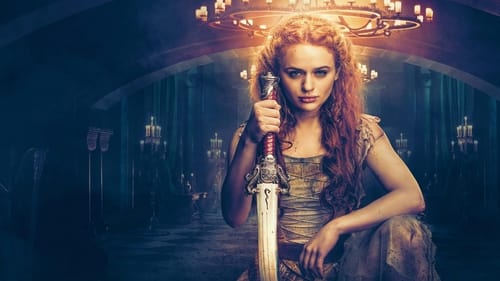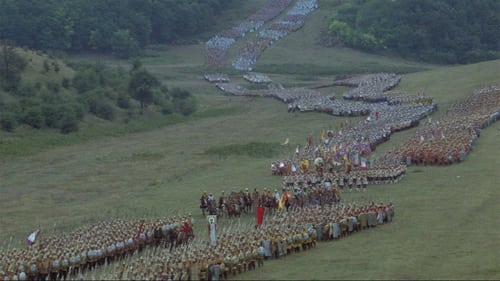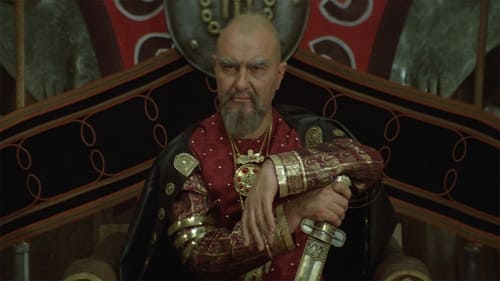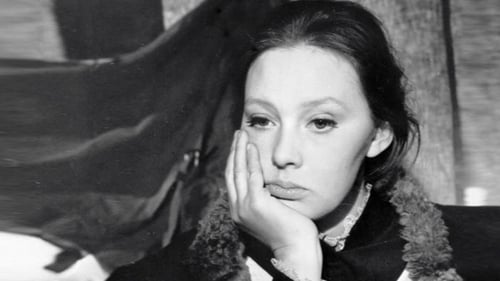Todor Todorov
Рождение : 1935-10-26, Grudovo, Burgas, Bulgaria
История
Todor Todorov was born on October 26, 1935 in Grudovo (Sredetz), Burgas, Bulgaria. He is an actor, known for Buna (1975), Petimata ot 'Mobi Dik' (1970) and Aszparuh (1981).

Tin Man
Когда волевая принцесса отказывается выйти замуж за жестокого социопата, ее похищают и запирают в отдаленной башне замка ее отца. С ее мстительным поклонником, намеревающимся занять трон ее отца, принцесса должна спасти королевство.

Monahat-razkazvach
Knyaz Boris I reached the most important spiritual insight - the country needed a single language and script. It accepts students of Cyril and Methodius, creating Ohrid and Preslav Literary School. What other nations took centuries, for bulgarians takes place only about 20 years after their baptizing - introduced a Slavonic Alphabet.

Monahat-razkazvach
The picture features the life and deeds of Boris I - strong historic personality, which completes his mission to the full and at the end of his life receives holy orders. Prince Boris I is ruling in the late 9th century. In his youth, he, the brilliant statesman and diplomat, is experiencing heavy defeats in the wars he wages against his neighbors. Nonetheless, he manages not to cede any territories to the enemies. Under his rule, Bulgaria breaks with paganism and joins the Christian community, paying an exorbitant price, a heavy death toll, but there is no other way. The adoption of Christianity in 864 was a historical event of great significance. It guaranteed Boris I much need peace with the Eastern Roman Empire and allowed him to merge the numerous tribes inhabiting the country into a unified nationality and later to found a state. Boris I introduced the Slav script, thus turning Bulgaria into the cradle of Slav culture.

The last part of the epic "Khan Asparukh" - "Land Forever" is an impressive finish to scale narrative, created for the nationwide celebration of 13 century anniversary of the Bulgarian state. The authors collected in final chord all storylines, culminating in the political strengthening of the young Bulgarian state. In the center of the film epic again is the image of Khan Asparukh - a lofty romantic hero who embodies the virtues and energy of his people.

This is an epic screen presentation showing the creation, the consolidation and the power of First Bulgarian Kingdom and the first Bulgarian ruler Khan Asparuh. The second part of the great historical epic - "The Migration" - tells about the long journey to the land of the Bulgarians of today's Bulgaria. Here the young Khan Asparukh laid the foundations of the new state. The authors adhere to the established historical versions for this event. The film builds on the impressive mass scenes and the convincing served psychological characteristics of the main characters. The image of Asparoukh is a natural center of the story, in which many minor persons recreate the environment of the Khan. Romantic exalted, Asparukh is shown as capable leader of the people, consistently implement his own ideas.

This is an epic screen presentation showing the creation, the consolidation and the power of First Bulgarian Kingdom and the first Bulgarian ruler Khan Asparuh. This is the first part of the film trilogy about the events before the creation of the Bulgarian state in the middle of the VII century. Volga Bulgaria is straining under the attacks of the Khazars. Following the testament of his father, the sons of Khan Kubrat looking for a new home for their tribes. The youngest of them - Asparukh, wander 20 years in search of "land forever" for his people and reaches the mouth of the Danube. The film is narrated by captured Byzantine chronicler Belisarius, which should Asparukh in his journeys. Byzantine witnessed the heroic efforts of the Bulgarians to win the land south of the Danube and to create their new country.

1876. The Turks murder the parents of the 14-year-old Rali. His only relative is sentenced to life imprisonment in the Asian fortress. Rali walks after the condemned men. After a long and painful road, he reaches the fortress. He finds help from the old man and his daughter. With their assistance, he organizes the escape of the condemned. After numerous adventures the fugitives reaches the motherland. They enlist in a Bulgarian rebel army together with the Russian soldiers of the Russian-Turkish War for the freedom of Bulgaria.

Second Bulgarian Rebel
О драматической судьбе замечательной русской женщины - графини Юлии Петровны Вревской. События ленты происходят в период русско-турецкой войны за освобождение болгарского народа от турецкого ига. Рано овдовевшая графиня, вложив все свои средства в организацию добровольческого санитарного отряда, становится сестрой милосердия на фронте. В 1878 году Юлия Вревская умирает от тифа в болгарском городе Бяла.

Stefan
Dimo Manchev (Partsalev), a 50-year-old head of family, has a conservative notion of upbringing and morality. Being familiar with his disposition, the Manchev's daughter Lili (Bratanova) married his sweetheart Plamen (Gadzhokov) in secret. The young couple cast about how to announce the marriage all the more that they are both still students studying in university. The hesitation grows when the father shows strictness even though they present their relation as some university friendship.

This film, set at the beginning of the 17th century, is the first East-European "Eastern". Bocskai István orders the free Heyducks to shepherd a huge herd of cattle through the country torn to three parts, to the Dalmatian coast, where he can get weapons in exchange, for fighting the Austrians.

Shukri
The days of antifascist fight are over. In an orphanage for gifted children lives Milcho. The music helps him to escape from the real world to the world of memories. He remembers the days that the police officer arrested his mother for hiding a fugitive. A bright mark has left people that Milcho met, looking for his mother: the good old musician, the gypsy Shukri - raw natural talent, the beautiful Mila, and the Poet. They help Milcho to live through his pain. A piano concert of Brahms is playing by the young artist.

Iosif
The beginning of the 20th century. The young Nona comes back to her father's farm from Switzerland. She meets colonel Galchev. The officer expresses his love for her. The teacher Yosif who is in love with Nona organizes a revolt of the villagers with no property. Armed villagers rob the farm. Galchev and his soldiers arrive. During the shooting, the colonel is killed. Nona accuses Yosif of Galchev's death. The carriage of Nona's fiancé, who travels from Switzerland to the village, passes by the coffin with Galchev's body. A second after the fiancé enters her house Nona kills herself.

A research worker Robespier Galabov (Yakovlev) lives with his family in a small communal flat with shared kitchen and dreams about a self-contained home. Galabov meet Rangel Lelin (Gospodinov), the well-known amidst the localities as the past-master, when he realized that the new municipal apartment they apply for won't be ready in the next decade. The Past-Master promises to build the private house in a month. After starting the construction, Rangel Lelin constantly blackmail Galabov for more money through treat of "putting the hat". Finally the house was built but the inauguration become gloomy. It turns out that the chimney of the fireplace doesn't work properly. After days of luckless attempts to solve the problem the past-master's brother come into sight. Knowing the Lelin's tricks he find a hat built in the chimney.

This poetic film presents the ballad of the boys who turned into stags, by the associative means of music, painting and folk art. At the same time it is a memorial to the martyrs of the 1944 Sátoraljaújhely prison revolt and shows its butchery reflected through the fate of three brothers.

Diversant
Two young couples decide to spend some vacation days on a small uninhabited island. Alas, soon they'll find out that the place turns to be not so isolated.

Iliasz
An aspiring film student is denied a scholarship to the state-funded university when his father is thrown in jail. The man had stopped a train in order to facilitate the union between two old friends. The son then takes a job as a land surveyor and meets a Greek man who works towards the collective benefits of the peasants. The man is killed in a peasant uprising prompted by a bureaucratic boondoggle. The surveyor looks after the man's widow as his emerging political and social awareness leads him take a stand against government injustice. Another incident, in which gypsies are rounded up by state hygiene workers, further galvanizes the man's beliefs. He photographs the incident, and his work allows him to be accepted into the school from which he was previously denied admission.

Mityo Ganev is a leader of the armed bandits. The authorities accuse the Communists of his robberies. The detachment commander, Chalaka, and Mityo Ganev have a meeting but fail to reach an agreement. The police burn out Mityo's house and send his mother into internal exile. Chalaka cuts him off from his logistical support base. Mityo agrees to join the partisan detachment. Mityo and Velyo hold up the paymaster of the army garrison. When they take the money, Mityo wants to give it to the family of the exiles. Enraged, Velyo hands the detachment over to the Colonel. Mityo kills the traitor. The police and he army launch a major operation against the partisans. In a fierce battle, Chalaka leads the detachment out of encirclement while Mityo covers their retreat. A bullet hits him.

Vlado
Five Bulgarian émigrés return to their country by submarine from the Soviet Union. They have to organize the antifascist resistance.





